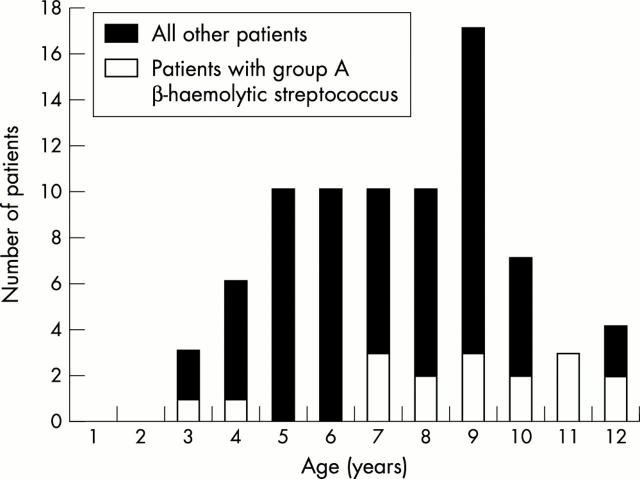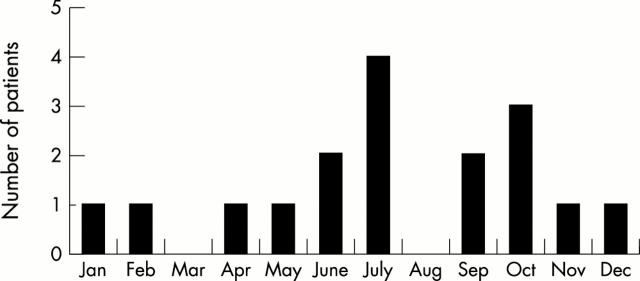Abstract
This retrospective study evaluated the clinical features and findings in bacterial cultures and in microscopic examination of vaginal secretions in 80 prepubertal girls, aged 2–12 years, with vulvovaginitis. Vaginal secretions were obtained directly from the vagina with a sterile catheter carefully inserted into the vagina. Pathogenic bacteria were isolated in 36% of cases. In 59% of these cases the isolated pathogen was group A ß-haemolytic streptococcus. Candida was not found in any of the patients. The finding of leucocytes in vaginal secretions as an indicator for growth of pathogenic bacteria had a sensitivity of 83% and a specificity of 59%. Antimicrobial treatment should therefore be based on bacteriological findings of vaginal secretions and not on the presence of leucocytes alone.
Full Text
The Full Text of this article is available as a PDF (107.7 KB).
Figure 1.
Age at presentation of 80 patients with vulvovaginitis.
Figure 2.
Yearly distribution of 17 cases of vulvovaginitis caused by group A ß-haemolytic streptococcus.
Selected References
These references are in PubMed. This may not be the complete list of references from this article.
- Altchek A. Pediatric vulvovaginitis. J Reprod Med. 1984 Jun;29(6):359–375. [PubMed] [Google Scholar]
- Arsenault P. S., Gerbie A. B. Vulvovaginitis in the preadolescent girl. Pediatr Ann. 1986 Aug;15(8):577-9, 583-5. doi: 10.3928/0090-4481-19860801-06. [DOI] [PubMed] [Google Scholar]
- Dhar V., Roker K., Adhami Z., McKenzie S. Streptococcal vulvovaginitis in girls. Pediatr Dermatol. 1993 Dec;10(4):366–367. doi: 10.1111/j.1525-1470.1993.tb00401.x. [DOI] [PubMed] [Google Scholar]
- Donald F. E., Slack R. C., Colman G. Streptococcus pyogenes vulvovaginitis in children in Nottingham. Epidemiol Infect. 1991 Jun;106(3):459–465. doi: 10.1017/s0950268800067509. [DOI] [PMC free article] [PubMed] [Google Scholar]
- Gerstner G. J., Grünberger W., Boschitsch E., Rotter M. Vaginal organisms in prepubertal children with and without vulvovaginitis. A vaginoscopic study. Arch Gynecol. 1982;231(3):247–252. doi: 10.1007/BF02110125. [DOI] [PubMed] [Google Scholar]
- Hammerschlag M. R., Alpert S., Rosner I., Thurston P., Semine D., McComb D., McCormack W. M. Microbiology of the vagina in children: normal and potentially pathogenic organisms. Pediatrics. 1978 Jul;62(1):57–62. [PubMed] [Google Scholar]
- Hill G. B., St Claire K. K., Gutman L. T. Anaerobes predominate among the vaginal microflora of prepubertal girls. Clin Infect Dis. 1995 Jun;20 (Suppl 2):S269–S270. doi: 10.1093/clinids/20.supplement_2.s269. [DOI] [PubMed] [Google Scholar]
- Jaquiery A., Stylianopoulos A., Hogg G., Grover S. Vulvovaginitis: clinical features, aetiology, and microbiology of the genital tract. Arch Dis Child. 1999 Jul;81(1):64–67. doi: 10.1136/adc.81.1.64. [DOI] [PMC free article] [PubMed] [Google Scholar]
- Koumantakis E. E., Hassan E. A., Deligeoroglou E. K., Creatsas G. K. Vulvovaginitis during childhood and adolescence. J Pediatr Adolesc Gynecol. 1997 Feb;10(1):39–43. doi: 10.1016/s1083-3188(97)70043-3. [DOI] [PubMed] [Google Scholar]
- Morris C. A. Seasonal variation of streptococcal vulvo-vaginitis in an urban community. J Clin Pathol. 1971 Dec;24(9):805–807. doi: 10.1136/jcp.24.9.805. [DOI] [PMC free article] [PubMed] [Google Scholar]
- Paradise J. E., Campos J. M., Friedman H. M., Frishmuth G. Vulvovaginitis in premenarcheal girls: clinical features and diagnostic evaluation. Pediatrics. 1982 Aug;70(2):193–198. [PubMed] [Google Scholar]
- Pierce A. M., Hart C. A. Vulvovaginitis: causes and management. Arch Dis Child. 1992 Apr;67(4):509–512. doi: 10.1136/adc.67.4.509. [DOI] [PMC free article] [PubMed] [Google Scholar]
- Vandeven A. M., Emans S. J. Vulvovaginitis in the child and adolescent. Pediatr Rev. 1993 Apr;14(4):141–147. doi: 10.1542/pir.14-4-141. [DOI] [PubMed] [Google Scholar]




